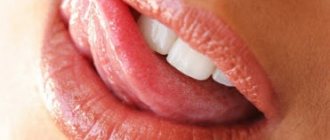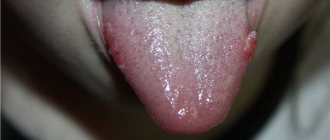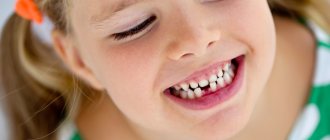Chewing, as well as grinding and grinding teeth during sleep is scientifically called bruxism. Surprisingly, the vast majority of people are sure that this phenomenon is a sign of the appearance of worms in a sleeping person. This is far from true.
Both chewing in your sleep and grinding your teeth are bruxism. This term comes from the Greek word brychein. Literally, this, in fact, means grinding one’s teeth, i.e. paroxysmal contractions of the masticatory muscles, which are accompanied by compression of the upper and lower jaws, as well as grinding of teeth, chewing movements and unpleasant creaking. Interestingly, this disease can occur in both children and adults.
Reasons for chewing in your sleep
Chewing in sleep or grinding teeth has its own medical term - bruxism. During sleep, a person's masticatory muscles reflexively contract, so he makes sounds similar to grinding or chewing. As a rule, such sounds are short-lived (a few seconds) and can be repeated several times during the night. It has been noted that the autonomic nervous system is also triggered by these movements. So, in a person suffering from bruxism, during the next episode of teeth grinding, the heart rate increases and the blood pressure level increases. Until now, it has not been possible to reliably identify a reason that would explain this phenomenon. One thing is clear - bruxism is not associated with the presence of worms in the human body, as has always been believed. Doctors draw a parallel with the presence of other changes during sleep, for example, snoring, enuresis, the presence of nightmares and sleepwalking.
Cause of the phenomenon
- snore;
- enuresis;
- nightmares;
- sleepwalking.
The only opinion with which all scientists agree is that the reasons for chewing in a dream are directly related to the reflection of a person’s emotional background during wakefulness. If you go to bed in a bad mood, your sleep will be restless and may be accompanied by various uncharacteristic sounds.
It is interesting that absolutely healthy people, whose lives are devoid of troubles and serious stress, are also susceptible to bruxism, and can smack or slurp while sleeping.
Treatment
Bruxism, slurping and smacking are not pathologies as such. Therefore, there is no one surefire recipe for treating strange sounds that a person makes during sleep. In most cases, such phenomena disturb those around them, although the person himself may wake up more than once due to his own grinding of teeth. The main danger of this condition is damage to teeth and abrasion of enamel. General recommendations for solving the problem include: avoiding stressful situations; relaxing gymnastics or yoga before bed; ventilation of the room; treatment of chronic diseases of the nasal cavity that impair free breathing; relaxing bath before bed; an evening walk; comfortable bed. If you cannot cope with this condition yourself, you should seek help from a doctor. Among the specialists who can help you, it is worth highlighting two – a psychologist and a neurologist. Because Most often, such phenomena may be associated with stress factors or other mental disorders; these specialists will be able to help solve your problem. In addition, such people should more often contact their dentists to assess the damage to their teeth and, if necessary, make a special mouthguard to protect their teeth, which must be worn at night.
List of used literature:
- Neurology. Handbook of a practicing physician. D. R. Shtulman, O. S. Levin. M. "Medpress", 2008.
- National Institutes of Health. NINDS Hypersomnia Information Page (June 2008). Archived April 6, 2012 (English)
- Poluektov M.G. (ed.) Somnology and sleep medicine. National leadership in memory of A.N. Vein and Ya.I. Levina M.: “Medforum”, 2020. 248 pp.
Answers:
Eared Creature
Mine not only slurps, but also talks at the same time =((((maybe they’ll answer something sensible….
ZAWEN
take me to the doctor!!
Spartacus
We need to calm him down! We men are like children!)))))))))))))))))))))) If a child is naughty, give him the breast and he will calm down!))))))))))) So as soon as he starts slurping in his sleep, give him breast! It will calm down instantly1 And you will be pleased too!)))))))))))))))))))))
What is the name of the disease when you slurp in your sleep?
Answers:
Felenka
kladius
"gut fornication"
*MADAMA*
hunger.. maybe I’m dreaming about food?))))
:))
There is no such disease :)
Beauty Will Save the World
What is such a disease?
angel of life
Grinding of teeth during sleep is quite common, but the mechanisms of its occurrence are not very clear. It is known that at this time there is a change in heartbeat, blood pressure and breathing. It is believed that teeth grinding during sleep - bruxism - may be one of the symptoms of sleep depth regulation disorders, such as somnambulism and nightmares.
Grinding of teeth during sleep occurs in approximately half of children worldwide. As a rule, over time, bruxism disappears by itself and does not entail any serious deviations in the psyche and behavior.
If your child suffers from bruxism, ask your dentist for recommendations. The doctor can make a special splint that will prevent the teeth from touching. Then your child will avoid toothache, wear and tear on the teeth and the joint connecting the lower jaw to the skull bone - the consequences of bruxism.
Regular physical activity that relieves stress and muscle tension will also help prevent or even cure this disease. The child should be active during the day, but an hour before going to bed, all games should be stopped. You should also not eat or drink anything other than plain water an hour before going to bed. Tense muscles need time to relax before your baby falls asleep.
Perhaps the cause of bruxism is overwork. In this case, put your child to bed an hour earlier than his usual bedtime. And be sure to talk to him. Discuss his affairs at school, in kindergarten, in the yard... This dialogue will have a calming effect and help relieve tension.
Why does a person bite his tongue in a dream?
During the day, such a nuisance has happened to everyone at least once in their life - it’s enough to chew food in a hurry or try to tell something to others at that moment.
It’s another matter if a person wakes up every morning with pain and discomfort in the mouth, finding fresh bite marks on the tongue, lips and inner surface of the cheeks.
This makes you think seriously about the reasons for biting your tongue in your sleep and look for ways to solve the problem.
Reasons for biting your tongue in your sleep
Biting the tongue and the inner surface of the cheeks during a night's rest occurs under excessive pressure from the chewing teeth. In this case, bleeding wounds may not appear immediately - first, white seals resembling calluses form on the mucous membrane.
Over time, if biting occurs regularly, the damage becomes deeper, blood oozes out every morning, and pain and discomfort do not disappear throughout the day. Because of this, ordinary brushing of teeth, eating and even talking turn into torture.
Of course, if a person accidentally bit his tongue one night, for example, when he had a bad dream, he hardly has any serious reason to worry about his health.
It’s another matter when this happens regularly or even several times a night - in this case, he needs consultation with specialists who will not only eliminate inflammation and pain, but also help avoid their occurrence in the future.
This could be due to incorrectly installed braces.
Why does this problem arise? Why is biting your tongue in a dream far from a harmless habit, but, on the contrary, an alarming symptom indicating a malfunction in the body? This type of disorder can be caused by:
- Bruxism , or teeth grinding during sleep. It is based on a spasm of the masticatory muscles, as a result of which the jaws close tightly and the person makes movements characteristic of chewing food. It is not surprising that in such a situation the soft tissues of the tongue are under attack. To solve the problem, it is necessary to find out what the true reason for the development of bruxism is, for example, prolonged emotional stress, an abnormal bite or a neurological disease, and also wear special silicone mouth guards at night that do not allow the teeth to close together.
- Incorrectly selected bracket system . If mistakes were made during the selection and installation of braces, a person may often touch his tongue with his teeth. It is quite possible to control such a process during the day, but it is hardly possible to constantly do this in a dream. This means that to avoid biting your tongue at night, you should use special elastic bands that lift the jaw and prevent the teeth from coming into contact with soft tissues.
- Bite abnormalities . As a rule, we are talking about the displacement of wisdom teeth. If they are tilted to the side, the shape of the dental arch as a whole changes, which is why the lateral surfaces of the tongue and cheeks can fall into the gap formed when the jaws close. Only a dentist can solve this problem by adjusting the position of the teeth or removing them completely.
- Apnea syndrome . With a sleep disorder of this kind, a short-term breath hold occurs, as a result of which the jaw completely relaxes and the tongue slips beyond the boundaries of the dentition. As soon as a person takes a new breath, the jaws close, sometimes quite seriously injuring the soft tissues of the tongue and cheeks.
- Prolonged stress . Frequent tongue biting at night is a form of sleep disorder, and its quality is largely determined by the emotional state of people. Constant anxiety and worries, depression and excessive mental stress deprive a person of the opportunity to completely relax and fully rest. Prerequisites for the development of parasomnias appear: teeth grinding, talking and moaning in sleep, sleepwalking, tongue biting, etc. Serious stress that the body has to endure, coupled with hormonal changes, often provokes similar disorders in pregnant women and young mothers immediately after childbirth
- Lyme disease . This disease rarely causes tongue biting during sleep, but it should not be discounted. In patients with this diagnosis, pathological changes affect the brain and nervous system, causing the body to send erroneous signals to the muscles, including during night rest.
And yet, the most common cause of tongue biting during sleep remains seizures, which are characteristic primarily of patients with epilepsy. During the night's rest, their muscle movements are poorly controlled by the brain, which is why the jaws can involuntarily close, seriously injuring the soft tissues of the oral cavity.
Why does a man slurp in his sleep?
Answers:
Sergei Gaponov
He's not in a restaurant...
gimp)))
He sees a delicious dream)))
Elena Grigorieva
Remembers mom...
Galina Korobova
We need to feed you dinner! :)
Inga
Looking forward to it!)
Raspberries
Are you sure it's a man?
Alexander Nerubin
hid something under the blanket and quietly ate it, pretending to be asleep
Fox Ant
Thinking about starting a pig farm!
Appocris
A man needs to be fed so that he doesn’t have tasty dreams.
Laura 1
In reality he drinks, but in his sleep he snacks.
Why does my cat quite often and for quite a long time slurp and smack his lips in his sleep? (He is 6 years old!!!)
Answers:
Ksenia
He has delicious dreams. My dog is 10 years old and she still smacks her lips, sometimes cries in her sleep, sometimes growls...
Kiryukha
Cute, mine likes it that way too =) They say cats are one of the few who dream... I assume your dream is about something tasty and appetizing, perhaps it needs to be fattened properly, but there is definitely no reason to worry - my cat has been like this for many years and doesn’t seem to complain
pharmat
This is due to a problem with his teeth. Contact your veterinarian. Good luck:)
Daria Ovsyannik
I also have a cat and she is almost 5 years old, she does this too. They probably dream about something related to water or milk
Lana
At least your cat smacks his lips, but my dog snores. Sometimes he barks and pushes with his paws. And he loves to sleep next to me on the pillow. Fortunately, the breed is not a Doberman, but just a Basset Hound. You kick her out, and she makes eyes at her... Pro.
Nusha
Almost all cats begin to do this from the age of 4 years, there is nothing wrong with it...
Chewing, as well as grinding and grinding teeth during sleep is scientifically called bruxism. Surprisingly, the vast majority of people are sure that this phenomenon is a sign of the appearance of worms in a sleeping person. This is far from true.
Both chewing in your sleep and grinding your teeth are bruxism. This term comes from the Greek word brychein. Literally, this, in fact, means grinding one’s teeth, i.e. paroxysmal contractions of the masticatory muscles, which are accompanied by compression of the upper and lower jaws, as well as grinding of teeth, chewing movements and unpleasant creaking. Interestingly, this disease can occur in both children and adults.
How to stop chewing, slurping and smacking in your sleep
Not all people suffer from bruxism. And not all people suffer from bruxism - their own or someone else's. It is a well-known opinion that physiological sounds are a problem not of the one who makes them, but of the one whom they irritate. But if the climax is reached when a person wakes up in the middle of the night from his own mighty slurp, then you should ask what experts - psychologists and neurologists - recommend in this regard:
- Calm, just calm - take a walk before bed, take a bath, read a book, listen to relaxing music, look out the window at the stars. The main thing is to come to a peaceful state, leaving worries and anxieties in the passing day.
- A warm compress will relax tense jaw muscles.
- A dental mouth guard will protect your teeth from nighttime chewing.
- Ventilation - fresh air in the bedroom is favorable for sleep.
- A comfortable bed - an orthopedic mattress, pillow, blanket with environmentally friendly and hypoallergenic fillings, pleasant bed linen in soothing colors will in any case prevent osteochondrosis and neuralgia.
- Herbal medicine - infusions of mint, fireweed, chamomile, oregano will strengthen sleep and the nervous system.
- Aromatherapy - the smells of essential oils of lavender, mint, vanilla, geranium, linden will calm your nerves and help you sleep.
You can also add light sports to your daily routine - table tennis, badminton, squash combine movement and concentration. This will help you take your mind off work and everyday problems and relieve stress.
If self-medication does not bring results, you should contact a psychologist and look for the reason in the subconscious. At the same time, undergo a full medical examination and consultation with a neurologist. In the absence of pathologies and anxiety, go to a session with a psychologist together with someone who is bothered by night sounds - probably the problem is not with them at all. In some cases, only a comprehensive medical examination can give an accurate answer to the question of why a person chews, slurps or smacks in his sleep.
Sometimes sleepers make funny sounds in their sleep: slurping, smacking, grinding their teeth in their sleep, and also something similar to chewing. If in the waking state this, although not beautiful, is more or less normal, then in the sleeping state it begins to irritate greatly. Especially when you are in the same hotel room or train compartment with him.
In the article, we will look at the nature of these sounds in sleeping people and figure out whether it is possible to get rid of them?
Why do people chew in their sleep?
It is worth noting that bruxism is a fairly common phenomenon. Interestingly, people suffering from this disease may chew and grind their teeth several times in one night. Until now, official science cannot explain the reasons for the occurrence of this strange phenomenon in humans. The fact is that scientists do not find any personality changes among “lovers” of chewing in their sleep.
Typically, several episodes of bruxism occur during sleep. They last no more than 15 seconds. If their duration is longer, this can lead to damage to the teeth and surrounding soft tissues.
However, doctors now associate sleep chewing with other manifestations of sleep depth dysregulation. These, of course, include snoring, nightmares, somnambulism (sleepwalking) and nocturnal enuresis (urinary incontinence).
It is curious that even in the 21st century, the popular point of view of the origin of bruxism does not lose its popularity. Today, as always, there is a widespread belief among people that chewing and grinding teeth in sleep is evidence of the appearance of worms in the sleeping body. However, scientists have not yet found significant confirmation of this! In addition, worms are no more common among “lovers” of night chewers than among other people who do not grind their teeth in their sleep.
Chewing or grinding teeth while sleeping
And this also has nothing to do with food. The reflex contraction of the masticatory muscles causes sounds such as grinding teeth in sleep. In medicine they have their own term - bruxism. This only lasts a few seconds, but up to 5-6 times per night. In this case, the pressure on the jaws is too strong, and if the duration of the sound lasts longer, tooth enamel may be damaged.
It happens in children and adults. It is popularly believed that teeth grinding is associated with the presence of worms in the body. But it has long been proven that this is not so, although people still believe in it. And scientists believe that teeth grinding is combined with sleepwalking, nightmares, and enuresis.
It is believed that if a person goes to bed with negative emotions, he instinctively clenches his jaw in anger and begins to grind his teeth while falling asleep.
People think all these sounds are a bad habit and that they can get rid of it through willpower. But sounds are made reflexively in a dream, and this suggests that will alone is not enough here. We need other ways to get rid of “bad” sounds.
What do scientists say?
Scientists increasingly agree that bruxism is common among those who regularly experience some kind of stress. The fact is that internal anxiety, anger, excitement before bedtime, and tension do not go unnoticed for both adults and children.
Treatment of bruxism still does not have any uniform principles. It depends entirely on the time of development of the phenomenon, as well as on the nature and reasons for its manifestation.
In addition, scientists make allowances for short-term chewing or grinding of teeth during sleep, lasting up to 10 seconds. They believe that this manifestation is also characteristic of completely healthy people who are on a positive note, experiencing positive emotions.
Teeth grinding at night is not harmless. Men and women, children and adults are equally susceptible to this unpleasant syndrome. Being close to such a person, close people (husband, wife or daughter) experience discomfort. Why can’t pathology be ignored, what health problems does it signal, what are its negative consequences? The article will tell you about this.
Complications that teeth grinding can cause
Dear reader!
This article talks about typical ways to solve your issues, but each case is unique! If you want to know how to solve your particular problem, ask your question. It's fast and free
!
Teeth grinding is not harmful to dental health. It often leads to serious consequences, including:
- abrasion of tooth enamel;
- increased tooth sensitivity;
- caries;
- malocclusion;
- displacement of the lower jaw and grinding of teeth to the base;
- reduced service life of dentures;
- gum problems.
If creaking is observed frequently, this means that the body does not relax. A person does not get proper rest, which worsens performance and creates a depressive mood.
Why do adults suffer from bruxism?
Psychological reasons
Polysomnographic studies that record brain impulses have shown that when a person sleeps with his jaw clenched, the onset of the grinding moment coincides with the rapid phase of dreams. Improper brain function affects the incorrect flow of shallow and deep periods of sleep and causes a reflex spasm of the jaw muscles.
Brain dysfunction, leading to teeth grinding at night, is observed in patients who are in a coma, suffering from Parkinson's disease, taking strong antidepressants, using drugs, or drunk. Unconscious night grinding during sleep is provoked by stress suppressed by a person during the day, and the habit of restraining negative emotions by clenching the jaw. Without receiving a discharge, the nervous system experiences overload and becomes exhausted. The accumulated tension finds release in the manifestations of grinding.
Gastrointestinal diseases
Pathological activity of the masticatory muscles occurs against the background of the absence of several teeth. Inadequate chewing of food leads to indigestion. Patients with the gastrointestinal tract sometimes grind their teeth. For example, hunger pains with gastritis provoke teeth grinding.
One theory links teeth grinding to gastroenterological causes. In particular, with gastroesophageal reflux disease, which manifests itself as heartburn. This hypothesis has not been reliably confirmed.
Signs of helminthic infestation
If we consider bruxism as a sign of helminthic infestation, then an indirect connection can be found. Certain types of worms impair the synthesis and absorption of B vitamins. B12 deficiency negatively affects nervous activity and contributes to the development of anomalies. Diagnosis requires the presence of other symptoms (nausea, abdominal pain), confirming the results of stool tests.
Infectious diseases
It has been noted that infectious diseases of the upper respiratory tract can be accompanied by teeth grinding. If a child grinds his teeth while sleeping, sometimes this indicates sinusitis.
Infectious diseases are a source of constant pain. Against this background, bruxism can develop, which is often noticed by parents of children whose treatment lasts for a long period.
Causes of sleep apnea
The causes of suffocation during sleep are not always associated with any diseases - rare attacks sometimes occur in the absence of any pathologies after drinking alcohol, psycho-emotional stress, taking certain medications, or in the presence of allergens in the room where a person sleeps. If stopping breathing during sleep occurs constantly, you should pay attention to your own health. The most common factors that cause this pathology include disruptions in the functioning of the body from various systems and organs.
- Dysfunctions of the cardiovascular system (angina pectoris, arrhythmia, vascular crises, acute heart failure). These pathologies are characterized by a violation of the heart’s ability to pump blood normally, which disrupts oxygen metabolism.
- Bronchial asthma. With this pathology, patients often experience shortness of breath, which can develop into nocturnal attacks of respiratory arrest.
- Thyroid diseases. With some endocrine pathologies, there is an enlargement of the thyroid gland, which puts pressure on the trachea - for this reason, during sleep, you lose your breath and feel suffocated.
- Sleep apnea. Sleep apnea syndrome is observed due to decreased muscle tone due to excess weight, abuse of sedatives, and enlarged tonsils. During the daytime, this condition is accompanied by drowsiness, a feeling of weakness, headaches in the morning, and surges in blood pressure.
- Panic attacks. Unstable functioning of the nervous system causes panic attacks and symptoms similar to cardiovascular diseases (increased or slow heart rate, chills, severe fear of death).
- Sleep paralysis. This is a condition that causes temporary immobilization. The brain does not send a signal to the rest of the body at the moment of awakening, which is why the person remains conscious, but cannot move or speak, sometimes sees hallucinations and feels intense fear.
If the above pathologies are excluded, the answer to the question of why you suffocate in your sleep should be sought in other factors. A list of secondary causes that can cause sleep apnea includes:
- infectious and inflammatory processes accompanied by swelling of the tonsils, enlarged adenoids, severe runny nose;
- anatomical pathologies of the head, neck, face;
- dysfunction of the digestive system, autoimmune disorders;
- excess weight;
- smoking, including passive smoking.
The first harbinger and another common cause of sleep apnea is constant snoring, which causes changes in the activity of the respiratory system, which is why suffocation develops. Accordingly, people who frequently snore are at risk for developing sleep apnea.
Pregnant women may also suffer from attacks of nocturnal suffocation - this occurs especially often in the last months, when the fetus begins to put pressure on the diaphragm. This condition does not pose a serious threat to the health of the mother or child, but in order to eliminate discomfort and reduce the risk of oxygen starvation, a woman is recommended to sleep on a bed with the head of the bed raised, or put pillows under her back.
How does it manifest?
The main manifestation is a feeling of suffocation and the inability to take a deep breath, and sometimes breathing stops when falling asleep, and in some cases it stops directly during the night's rest. Those who have had to deal with this condition describe it as follows: “I wake up from not breathing, or suffocate when I fall asleep, I am afraid of not waking up again, but at the same time I cannot move and ask for help.” This condition develops in several stages:
- at the first stage, the activity of the respiratory organs is activated, the frequency and depth of breaths increase along with blood pressure and pulse;
- the next phase is characterized by the opposite process - vital signs decrease, fingers and the nasolabial triangle acquire a bluish tint;
- during the third stage, the activity of the respiratory organs is disrupted, breath holding occurs, which lasts from a couple of seconds to 2-3 minutes, reflexes fade, blood pressure drops, convulsions or uncontrolled muscle twitching may develop;
- During the last phase, serious disturbances in the respiratory rhythm occur - breathing becomes short and deep, inhalations become difficult and convulsive, and exhalations become rare.
Some people are unaware that they stop breathing during sleep or when falling asleep. To identify violations, it is necessary to observe the state of the sleeping person - he begins to snore, after which apnea occurs. Snoring and breathing noise subside, the chest and stomach move, and after 15-30 seconds breathing is restored, the sleeper snores loudly, and normal breathing is restored. Sleep at this time, as a rule, is very restless - a person rushes about, moves his limbs and tries to say something.
Features of bruxism in children and adolescents
The causes of teeth grinding in children and adolescents are the same as in adults (we recommend reading:). Their manifestation has features associated with the processes of growth and development of the child’s psyche:
Children require increased care aimed at maintaining a daily routine, diet and rest, and creating a favorable psychological environment. Bruxism in children usually goes away on its own. No treatment is required due to the formation of a stimulus-resistant nervous system during adulthood.
How to get rid of teeth grinding at night?
The most common cause of nighttime anxiety associated with the complaint that I grind my teeth in my sleep is nervous tension. There are several techniques that can help cope with the problem:
- One way is to learn to relax your muscles. Hard food will help, which will tire the chewing apparatus while eating. The rest of the time you need to keep your jaws relaxed. Before going to bed, apply a warm compress to the lower area of your face for half an hour.
- The following will help eliminate overstrain: proper organization of the working day, avoidance of stressful situations, avoidance of irritating and stimulating drugs and drinks. If you have bruxism, it is helpful to reduce your sugar intake.
- Infusions of chamomile and hawthorn, and valerian (in tablets or tincture) have a calming effect. Baths with aromatic oils promote relaxation after a tiring day.
Mouth guard to wear at night
The silicone applicator eliminates contact between the teeth, prevents them from wearing off and restores the correct bite. The mouthguard is placed in the mouth before bedtime.
Regardless of the reasons causing bruxism, the patient is recommended to wear such protection before starting treatment. It helps the jaws relax and forms the habit of being in the desired position.
Before treating the consequences, you need to eliminate the symptoms of bruxism. To get rid of them, you should understand why the phenomenon of teeth grinding occurs:
- if the bite is disturbed, a trip to the dentist is necessary;
- if there are problems of a psychological nature, treatment is carried out by a psychologist;
- Nervous system disorders are the area of interest of a neurologist.
A representative of the American School of Dentistry, Associate Professor Andrew Kaplan, to get rid of creaking, recommends sticking to a pattern during the day in which the lips are closed and there is a gap between the teeth. Only when eating should your teeth touch.
How to restore your tongue after hard biting?
In most cases, the injury will heal within a week, so there is no need to visit a doctor. Human saliva has natural healing properties and will speed up the healing of damaged tissue. Additionally, you can use some home remedies. Doctors recommend applying ice to the area where the blood is flowing and rinsing your mouth with salty sea water.
Important! Spicy foods should be avoided until the pain completely disappears.
If bleeding from the mouth does not stop for several hours after waking up, you should seek medical help.
If bleeding from the mouth does not stop for several hours after waking up, you should seek medical help. Perhaps an infection has entered the body, or problems with blood clotting are developing. It is also worth contacting your dentist, who will select suitable protection for your teeth to prevent repeated bites. Usually, the doctor makes a special mouthguard based on an impression of the jaw, which must be put on before going to bed.










